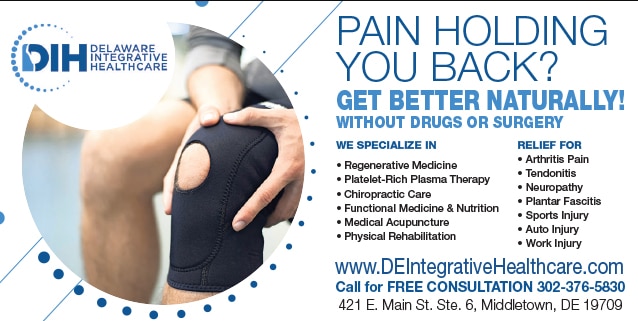Regenerate . . . Before It’s Too Late!
People who suffer from problems like muscle strains and sprains, arthritis and other musculoskeletal conditions often turn to Regenerative Medicine. This is a field of treatment that aims to stimulate the body’s own healing abilities to prevent the need for surgery. Two types of Regenerative treatments offered at Delaware Integrative Healthcare are Prolotherapy and Platelet Rich Plasma (PRP).
In both, the injured or hurting person receives a series of injections with the goal of regenerating and repairing injured ligaments and tendons. Here is a short summary of how PRP and Prolotherapy work and what they’re typically used for.
What Is Prolotherapy and How Does It Work?
Prolotherapy is a widely recognized orthopedic procedure that both repairs and strengthens painful joints and connective tissue after they have become injured. Prolotherapy gets its name from the longer form of the term, “proliferative therapy,” because of its ability to proliferate and regenerate injured tissue.
In Prolotherapy, an irritative agent, usually consisting of a sugar-like substance, is injected into the injured area. This stimulates an acute inflammatory reaction that initiates a healing response. One common result of Prolotherapy injections is the creation of fresh collagen by the body, which helps to stabilize the area and get back to doing its job properly. After that, the issues of inflammation and pain are usually resolved.
What Is PRP Therapy and How Does It Work?
PRP, as its name implies, uses the body’s own blood platelets to help heal an injured area. PRP is a process which starts by drawing a person’s own blood, spinning it in a centrifuge to concentrate the plasma, and then injecting the plasma into the injured area.
PRP is rich in proteins such as Platelets, Growth Factors, and Cytokines, which work to heal and regenerate the injured area. It is an all-natural treatment, since it’s using the person’s own blood. It is common for people who undergo PRP to have slight swelling or mild pain the next day, but that’s to be expected and usually abates after a few hours.
What Are the Two Therapies Used For?
The most common applications for Prolotherapy and PRP are for orthopedic conditions, however the field is evolving and new uses are being discovered all the time.
Prolotherapy is used to treat pain and injuries including, but not limited to:
- Degenerative Arthritis
- Muscle and Tendon Injuries
- Back Pain
- Knee Pain
- Hip Pain
Platelet-rich Plasma, or PRP, is frequently used to treat things like:
- Tendonitis
- Arthritic Conditions
- Achilles Tendinosis
- Plantar fascia tears or related injuries
Prolotherapy and PRP injections are relatively painless. They can be performed in a doctor’s office with no anesthesia required. Both therapies require a full medical history and a short screening process to see if a person is a good candidate for the treatment.
Make sure to find a medical provider who will thoroughly assess your problem and get to the root cause of it. Many traditional medical treatments, such as medications and Cortisone injections, simply mask the symptoms. The primary goal of Regenerative Medicine is to get to the root cause of this issue, and to use the body’s own inherent healing capabilities to fix it. It is also then important to strengthen and stabilize the area, so it is frequently followed with a course of home or in-office rehabilitation.
How To Decide Which Method Is Right For You
Anyone who suffers from chronic or acute pain knows what it means to search for alternatives to surgery and short-term pain medications. At Delaware Integrative Healthcare, our team of providers are able to assess your problem with a comprehensive examination and digital x-ray on-site. They can then advise on whether the problem can be treated with Regenerative Medicine.
If you have any questions concerning these two strategies for reducing pain and getting you back into the mainstream of life again, without surgery or drugs, call us at 302-376-5830 to set up a free initial consultation.


